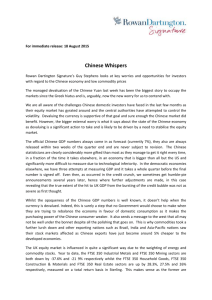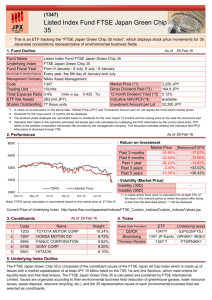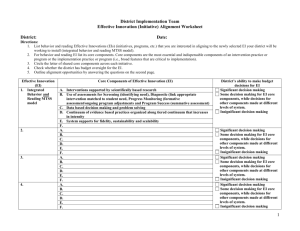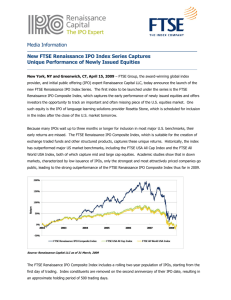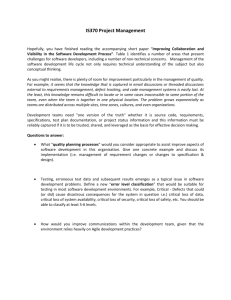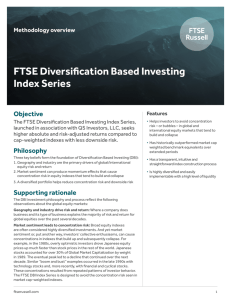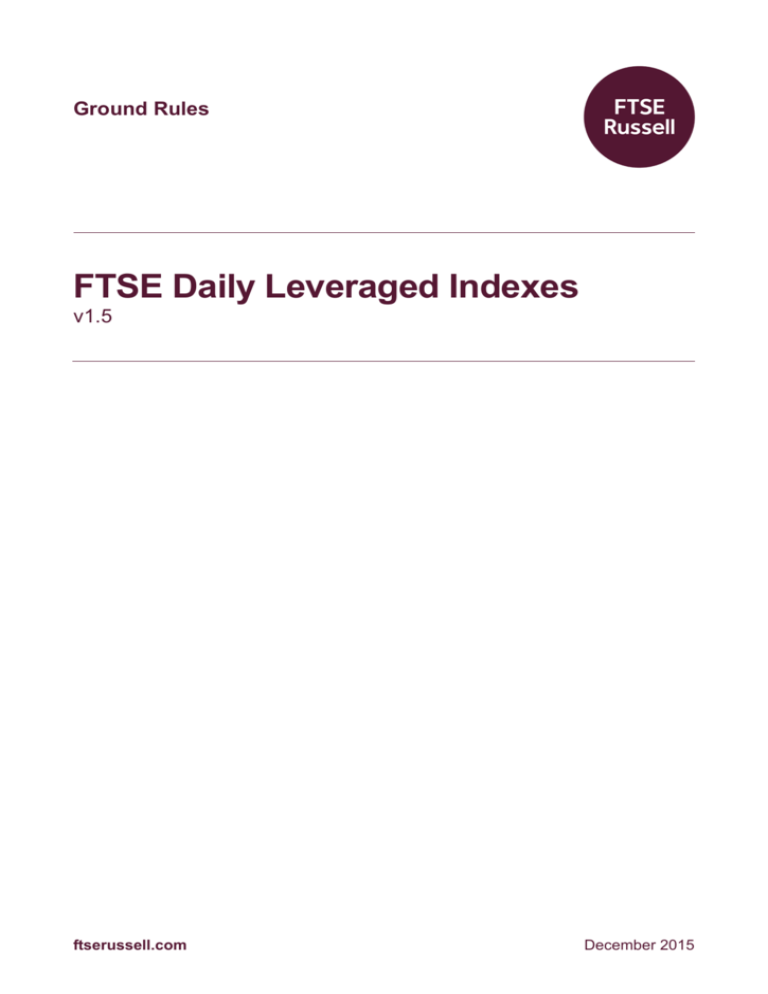
Ground Rules
FTSE Daily Leveraged Indexes
v1.5
ftserussell.com
December 2015
Contents
1.0
Introduction ......................................................................... 3
2.0
The Index ............................................................................. 5
3.0
Formula symbols ................................................................ 9
4.0
Glossary ............................................................................ 10
5.0
Example calculation ......................................................... 12
Appendix A: Further information .............................................. 15
FTSE Russell | FTSE Daily Leveraged Indexes, v1.5, December 2015
2 of 15
Section 1
Introduction
1.0
Introduction
1.1
General
FTSE Daily Leveraged Indexes (Daily Leveraged indexes) aim to reflect a multiple of the daily
performance of an underlying reference index.
1.2
Objective
The objective of the Daily Leveraged indexes is to reflect the leveraged performance of an
underlying index, after incorporating leverage financing costs. The Daily Leveraged indexes reflect
five aspects of the performance of leveraged indexes.
1.3
A.
Capital gains associated with the underlying index.
B.
Cash dividends paid by the underlying securities net of withholding tax.
C.
The financing costs of leverage.
D.
The spread between overnight interest rates and the longer term 12 month interest rate.
E.
Index rebalancing costs
Index features, terms, base dates and base values
The features of each index, including base dates, base values, index terms, index calculation times
and vendor codes can be found at
http://www.ftse.com/products/downloads/Real_Time_Short_and_Leveraged_Index_Features.xlsx
1.4
Computational accuracy
The index will be calculated to 13 decimal figures and published rounded to 2 decimal places.
1.5
Frequency and time of calculation
The Daily Leveraged indexes will be calculated intra-day on a 15 second pulsed basis.
1.6
Trading suspension
The Daily Leveraged indexes are calculated on the same days as the underlying reference indexes
are calculated. If there is a suspension of a relevant underlying reference index the Daily Leveraged
index will be calculated using the latest value available and will then itself be suspended.
FTSE Russell | FTSE Daily Leveraged Indexes, v1.5, December 2015
3 of 15
1.7
FTSE Russell
FTSE Russell is a trading name of Frank Russell Company (FRC), FTSE International Limited
(FTSE) and FTSE TMX Global Debt Capital Markets, Inc. (FTSE TMX). FRC, FTSE and FTSE TMX
are each benchmark administrators of indexes. References to FTSE Russell should be interpreted
as a reference to the relevant benchmark administrator for the relevant index.
1.8
FTSE Russell hereby notifies users of the index series that it is possible that circumstances,
including external events beyond the control of FTSE Russell, may necessitate changes to, or the
cessation, of the index series and therefore, any financial contracts or other financial instruments
that reference the index series should be able to withstand, or otherwise address the possibility of
changes to, or cessation of, the index series.
1.9
Index users who choose to follow these indexes or to buy products that claim to follow this index
series should assess the merits of the index’s rules-based methodology and take independent
investment advice before investing their own or client funds. No liability whether as a result of
negligence or otherwise is accepted by FTSE Russell or its licensors (or any person concerned with
the preparation or publication of these Ground Rules) for any losses, damages, claims and
expenses suffered by any person as a result of:
1.10
A.
any reliance on these Ground Rules, and/or
B.
any errors or inaccuracies in these Ground Rules, and/or
C.
any non-application or misapplication of the policies or procedures described in these Ground
Rules, and/or
D.
any errors or inaccuracies in the compilation of the index or any constituent data.
These Ground Rules
These Ground Rules provide information about the publication of the FTSE Daily Leveraged Indexes
and set out the methodology underlying them.
1.11
Status of the Indexes
The status of the indexes is determined by the calculation status and by the status of the underlying
reference index.
A table of possible index status codes arising is shown below:
Index status codes
Underlying Reference Index Status
Leveraged Index Status
N (normal)
N (normal)
N (normal, during intra-day reset)
X (exception, during intra-day reset)
N (normal, post intra-day reset)
R (index reset, post intra-day reset)
K (part calculated)
N (normal)
I (indicative)
H (hold, calculate but don’t publish and do
not apply intra-day resets)
H (hold)
H (Hold)
C (closed)
C (closed)
FTSE Russell | FTSE Daily Leveraged Indexes, v1.5, December 2015
4 of 15
Section 2
The Index
2.0
The Index
2.1
Index calculation
The Leveraged Index value is calculated as 1 plus the leveraged index return since the start of the
current calculation session multiplied by the previous session leveraged index closing value.
2.2
LIDXt = LIDXs × (1+r)
Return calculation (r)
The return r consists of the leveraged return of the underlying index less the financing costs, liquidity
spread and any rebalancing costs.
2.3
r=�LIRt - FCt,t-1 -LSt,t-1 -RBt �
Leveraged index return calculation (LIRt)
The leveraged index return is a multiple (K) of the underlying index return.
The leveraged index return is calculated relative to the previous day’s closing value on days where
no intra-day reset occurs. If an intra-day reset occurs the leveraged index return is calculated
relative to the previous session’s final index value.
2.4
Finance cost calculation (FC)
LIRt = �K* �
TRNt
-1��
TRNs
The finance cost arises as a result of raising capital to undertake the required levels of leverage.
The leveraged financing cost for Dt,t-1 calendar days is:
Rt-1
� ×Dt,t-1 �
FCt,t-1 = �(K-1)× �
DayCountBasis
In the event of interest rate (Rt-1) turning negative the finance cost (FCt,t-1) is set to 0 (zero)
No additional financing cost is applied after an intra-day reset occurs.
2.5
Liquidity spread cost (LS)
In order to reflect the reality of wider spreads between the interbank and the swap market rates post
June 2007, a liquidity spread term was introduced.
FTSE Russell | FTSE Daily Leveraged Indexes, v1.5, December 2015
5 of 15
The liquidity spread is the difference between the twelve month interbank interest rate and the 12
month overnight indexed swap rate.
SPRD= IR- Swap
The liquidity spread cost for Dt,t-1 calendar days is given by:
LSt,t-1 = (K-1)× �
SPRD
� ×Dt,t-1
DayCountBasis
The liquidity spread is set to zero if the spread becomes negative.
To obtain a representative number for the liquidity spread an average spread is calculated over the
five business days prior to the notification date each month.
The liquidity spread is updated monthly and implemented after the close on the third Friday of the
month and is effective from the next business day.
A technical notice is issued at the close, two business days prior to the effective date of the third
Friday of each month giving notice of the applicable value for the next month. This is typically the
Wednesday before the third Friday and is known as the notification date.
No additional liquidity spread cost is applied after an intra-day reset occurs.
Long-term interest and swap reference data used in the calculation of the liquidity spread can be
found in the Appendix.
Historic liquidity spread values can be found on www.ftse.com.
2.6
Leveraged Index rebalancing cost (RBt)
This arises where stamp duty or other costs are applicable to changes in the underlying reference
index. An additional rebalancing cost is applied after an intra-day reset occurs.
This term is only applicable to certain indexes. Other indexes use a default value of zero. Applicable
indexes are listed in the Appendix.
RBt = �K×(K-1)× ��
where
TC =
2.7
TRNt
-1�� ×TC�
TRNs
StampDuty+Execution Cost
Extreme market movements
In order to mitigate the risk of total loss due to extreme market movements, an intra-day reset
mechanism is employed. The intra-day reset is triggered by movements in the underlying index that
are greater than the predefined limits shown in the table below.
To determine whether an intra-day reset is triggered, the most recent value of the underlying index is
compared to the previous session’s final level. If the decline in the underlying index is greater than or
equal to the trigger level for the relevant level of leverage, the intra-day reset process is initiated.
The previous session’s final level is normally the previous trading day’s closing level, but in the case
of an intra-day reset being triggered, it is the minimum underlying index value observed during the
15 minute observation period.
FTSE Russell | FTSE Daily Leveraged Indexes, v1.5, December 2015
6 of 15
Leverage factors
2.8
Index Name
Leverage Factor
Intra-day Reset Trigger Levels
FTSE Daily Leveraged Index
2
25%
FTSE Daily Super Leveraged Index
3
20%
FTSE Daily Ultra Leveraged Index
4
15%
Intra-day reset procedure
The intra-day reset procedure is invoked if a predefined movement in the underlying index is
exceeded, unless the time to the end of the calculation day is less than 17 minutes. In this situation
the index will continue to be calculated normally.
If the time to the end of the day is greater than 17 minutes the following process is followed:
i.
The calculated index status is set to “X” and held for the duration of the 15 minute
observation period.
ii.
The value of the underlying index at the beginning of the observation period is recorded.
iii.
All values of the underlying index during the 15 minute observation period are recorded.
iv.
The minimum value of the underlying index recorded during the observation period
determines the session’s closing value, denoted as TRNs.
v.
The closing session value of the underlying index i.e. TRNs is published.
vi.
The index is held for a further 2 minutes to allow the reset process to complete. The index
status is set to “R” and the index continues to publish values based on the TRNs.
The intra-day reset is carried out by simulating the beginning of a new business day. However no
additional Financing or Liquidity costs are included.
From the reset point onwards, the return on the leveraged index is the leveraged return on the
underlying index less any rebalance costs associated with index transaction costs.
TRNt
TRNt
LIDXt
-1= �K× �
-1�� - �K×(K-1)× ��
-1�� ×TC �
LIDXs
TRNs
TRNs
In the event that subsequent movements of the underlying index after an intra-day reset result in an
additional breach of the trigger levels, an additional intra-day reset will be invoked.
2.9
Reverse split
If the leveraged index closes below the level of 100 a reverse split (consolidation) in the ratio of
100:1 will be implemented.
A technical notice will be issued to the market giving two business days’ notice of the implementation
of the reverse split.
During the two day period the index will calculate normally and if an intra-day reset is triggered the
observation period procedure will come into effect as outlined in 2.8 above.
The reverse split will be effective from the open on the third business day after the reverse split was
triggered.
The rebased index level resulting from the reverse split is determined by the closing leveraged index
level two business days after the trigger event scaled by 100.
For example if the closing leveraged index level on the trigger day was 99.55 and the closing level
two business days later was 87.50 the new rebased index level will be 8,750.
FTSE Russell | FTSE Daily Leveraged Indexes, v1.5, December 2015
7 of 15
If during the two day period between the trigger event and the index rebasing, the leveraged index
level recovers to a level above the trigger level the reverse split will still be applied.
If during the two day period between the trigger event and the index rebasing, the index continues to
fall and becomes negative the leveraged index will be set to zero and its calculation/publication
discontinued. No reverse split will be applied.
2.10
Cessation of index calculation
In the event of the leveraged index value becoming negative, the index value will be set to zero and
its calculation/publication discontinued.
If an overnight change of the underlying index results in an opening value of the leveraged index of
zero (or below), the leveraged index value will be set to zero and its calculation/publication
discontinued.
If an overnight change of the underlying index results in a breaches of the intra-day trigger limits but
does not result in the leveraged index becoming zero or negative a standard intra-day reset will be
triggered and the observation period procedure will come into effect.
FTSE Russell | FTSE Daily Leveraged Indexes, v1.5, December 2015
8 of 15
Section 3
Formula symbols
3.0
Formula symbols
3.1
Subscripts
3.2
12m
=
12 month
s
=
Previous session
t
=
Current session
t-1
=
Previous calculation day
Main Terms
DayCountBasis =
Day count convention for the interest rates
Dt,t-1
=
Number of calendar days between current session and previous calculation date t-1
FC
=
Finance cost
IR
=
12 month interbank interest rate
Rt-1
=
Annualised overnight unsecured lending rate at t-1
K
=
Leverage factor
LIDXs
=
Previous session Leveraged Index value
LIDXt
=
Current session Leveraged Index value
LIRt
=
Current session Leveraged Index return
LS
=
Liquidity spread cost
r
=
Session return
RBt
=
Current session Leveraged Index Rebalance cost
SD
=
Stamp duty as a percentage of the value of stock traded.
SPRD =
Spread reflecting difference between the 12 month interbank rate and the 12 month
overnight indexed swap rate.
Swap
=
12 month Capitalised Overnight Rate
TRNs
=
Previous session underlying Net Total Return Index level
TRNt
=
Most recent underlying Net Total Return Index level
FTSE Russell | FTSE Daily Leveraged Indexes, v1.5, December 2015
9 of 15
Section 4
Glossary
4.0
Glossary
4.1
EONIA – Euro Overnight Index Average
EONIA® (Euro Overnight Index Average) is the effective overnight reference interest rate for the
euro. It is computed as a weighted average of all overnight unsecured lending transactions
undertaken in the interbank market, initiated within the euro area by the contributing banks.
Thomson Reuters publishes the EONIA® reference rate on Reuters page "EONIA=", which is made
available to all its subscribers and to other data vendors.
4.2
EONIA Swap Index
EONIA SWAP INDEX is the average rate at which, at 11:00 Brussels time, a representative panel of
prime banks provide daily quotes, rounded to three decimal places, that each Panel Bank believes is
the Mid-market rate of EONIA swap quotations between prime banks. It is quoted on an actual/360
day basis.
An "EONIA swap" is an interest rate swap transaction, where one party agrees to receive/pay a fixed
rate to another party, against paying/receiving a floating rated named EONIA.
EONIA SWAP INDEX is published by REUTERS on page "EONIAINDEX" and Bloomberg (EBF
<GO>).
4.3
EURIBOR – 12m Interest Rate
EURIBOR® is the rate at which Euro interbank term deposits are offered by one prime bank to
another prime bank within the EMU zone, and is published at 11:00 a.m. (CET) for spot value (T+2).
4.4
SONIA – Sterling Overnight Interbank Average Rate
SONIA is the weighted average rate of all unsecured sterling overnight cash transactions brokered in
London between midnight and 4.15pm with all counterparties in a minimum deal size of £25m. It is
the weighted average overnight deposit rates for each business day and the index is published at
5:00 pm London time each day.
4.5
TIBOR – Tokyo Interbank Offered Rate
TIBOR is the daily reference rate based on the interest rates at which banks offer to lend unsecured
funds to other banks in the Japan wholesale money market. The quotes are provided at about 11:00
am JST.
FTSE Russell | FTSE Daily Leveraged Indexes, v1.5, December 2015
10 of 15
4.6
TONAR – Tokyo Overnight Average Rate
TONAR is the weighted average rate of all unsecured overnight cash transactions between financial
institutions. The rate is published by the Bank of Japan (BOJ). The rate is published at 10:00 am
JST, the next business day.
FTSE Russell | FTSE Daily Leveraged Indexes, v1.5, December 2015
11 of 15
Section 5
Example calculation
5.0
Example calculation
5.1
Example calculation
Calculate the FTSE MIB Daily Ultra Leveraged Index value (LIDX) for Monday 02 January 2012 (t).
The reference underlying index is FTSE MIB Net-of-Tax (Lux) TR Index.
Model Inputs:
EONIA (30 Dec 2011)
= 62.9 bps
Day count basis
= 360
Leverage factor
=4
12m EURIBOR
= 194.7 bps
EONIA 1Yr Swap
= 38.2 bps
SPRD
= 156.5 bps
TRNs (FTSEMIBN)
= 20707.62
TRNt (FTSEMIBN)
= 21208.35
LIDXs (FMIBL4X)
= 10000
Previous trading day (t-1)
= 30 Dec 2011
Model Outputs
Number of calendar days (Dt,t-1)
=3
Return on Underlying Index
= 0.024181
Leveraged Return
= 0.096724
Finance Cost
= 0.000157
Liquidity Spread Cost
= 0.000391
Return (r)
= 0.09618
1+r
= 1.096175
LIDXt (FMIBL4X)
= 10961.75
FTSE Russell | FTSE Daily Leveraged Indexes, v1.5, December 2015
12 of 15
5.2
List of Leveraged Indexes
Leverage
Factor
Index Code
Index name
FMIBL2X
FTSE MIB Daily Leveraged RT Net-of-Tax (Lux) TR Index
2
FMIBL3X
FTSE MIB Daily Super Leveraged RT Net-of-Tax (Lux) TR Index
3
FMIBL4X
FTSE MIB Daily Ultra Leveraged RT Net-of-Tax (Lux) TR Index
4
FMIBL5X
x5 Daily Leveraged FTSE MIB Daily RT Net-of-Tax (Lux) TR Index
5
FMIBL2
FTSE MIB Daily Leveraged Index
2
UKXL2X
FTSE 100 Daily Leveraged RT TR Index
2
UKXL3X
FTSE 100 Daily Super Leveraged RT TR Index
3
UKXL4X
FTSE 100 Daily Ultra Leveraged RT TR Index
4
UKXL5X
x5 Daily Leveraged FTSE 100 RT TR Index
5
UKXL2
FTSE 100 Daily Leveraged Index
2
MCXL2X
FTSE 250 Daily Leveraged RT TR Index
2
MCXL3X
FTSE 250 Daily Super Leveraged RT TR Index
3
MCXL4X
FTSE 250 Daily Ultra Leveraged RT TR Index
4
SLQUSL2
FTSE USA Large Cap Super Liquid 2x Daily Leveraged Index
2
SLQUSL3
FTSE USA Large Cap Super Liquid 3x Daily Leveraged Index
3
SLQUSL4
FTSE USA Large Cap Super Liquid 4x Daily Leveraged Index
4
SLQUKML2
FTSE UK Mid Cap Super Liquid 2x Daily Leveraged Index
2
SLQUKML3
FTSE UK Mid Cap Super Liquid 3x Daily Leveraged Index
3
SLQUKML4
FTSE UK Mid Cap Super Liquid 4x Daily Leveraged Index
4
SLQJPLL2
FTSE Japan Large Cap Super Liquid 2x Daily Leveraged Index
2
SLQJPLL3
FTSE Japan Large Cap Super Liquid 3x Daily Leveraged Index
3
SLQSPL2X
FTSE Spain Super Liquid 2x Daily Leveraged Index
2
SLQSPL3X
FTSE Spain Super Liquid 3x Daily Leveraged Index
3
DXNAL1QX
FTSE Developed Ex NA 1.25x Daily Leveraged No Spread Index
1.25
FTEML1QX
FTSE Emerging 1.25x Daily Leveraged No Spread Index
1.25
USCSLL2X
FTSE USA Small Cap Super Liquid 2x Daily Leveraged Index
2
USCSLL3X
FTSE USA Small Cap Super Liquid 3x Daily Leveraged Index
3
XIN0UL2X
FTSE China 50 2x Daily Leveraged Index
2
XIN0UL3X
FTSE China 50 3x Daily Leveraged Index
3
R1GLEV125
Russell 1000 Growth 1.25x Daily Leveraged Index
1.25
R1VLEV125
Russell 1000 Value 1.25x Daily Leveraged Index
1.25
R2LEV125
Russell 2000 Daily Leveraged Index
1.25
WIJPNL2X
FTSE Japan 2x Daily Leveraged Index
2
WIJPNL3X
FTSE Japan 3x Daily Leveraged Index
3
FTSE Russell | FTSE Daily Leveraged Indexes, v1.5, December 2015
13 of 15
5.3
Overnight, 12m and Swap Rates
5.3.1
The table below contains the overnight, 12m and swap rates used for the corresponding base
currency and their Bloomberg Tickers .
Overnight, 12m and Swap Rates
O/N
12M
Swap 12m vs. O/N
Ccy
Name
Name
Name
EUR
EONIA
EURIBOR 12M
EUR Swap (EONIA) 1YR
USD
Fed Fund Eff Rate
LIBOR USD 12M
USD Swap OIS 1YR
GBP
SONIA
LIBOR GBP 12M
GBP Swap vs. SONIA 1YR
CHF
SARON
LIBOR CHF 12M
CHF Swap Fix 1YR vs. 6M
JPY
TONAR
TIBOR Fixing Rate 1 Year
JPY Swap vs TONAR 1Yr
HKD
HIBOR
HKD 12M HIBOR
HKD Swap 1Y
5.4
Stamp Duty and Execution Cost
5.4.1
The table below contains the Stamp Duty and Execution Cost
STAMP DUTY AND EXECUTION COST
Index Code
Index Name
Stamp Duty (%)
Execution Cost (%)
XIN0UL2X
FTSE China 50 2x Daily
Leveraged Index
0.1
0.05
XIN0UL3X
FTSE China 50 3x Daily
Leveraged Index
0.1
0.05
5.5
Historic liquidity spread values
5.5.1
Liquidity spread values are updated monthly and effective after the close of business on the third
Friday of the month.
5.5.2
Prior to June 2007 obtaining liquidity in the market to finance the leveraged positions used the
spread between a 1 year interest rate and overnight rate used to fund the capital needed for the
leveraged position was negligible.
5.5.3
Post 2007 the spread between a 1 year interest rate and overnight rate widened due to the credit
crisis. From July 2007 onwards the change in liquidity spread is taken into account in the index
calculation model.
5.5.4
This is reflected as the difference between a long term rate (1Y) and 1Y Capitalised Overnight Rate
(swap price).
5.6
A note on calculating back histories
5 years of back history is available for the Daily Leveraged indexes. Where available they have been
calculated using a net of withholding tax total return index on the underlying index.
Prior to July 2007, the Liquidity Spread was set at zero, as liquidity was plentiful. After the financial
crisis of 2007, a calculated spread has been used as described in section 2.7.
FTSE Russell | FTSE Daily Leveraged Indexes, v1.5, December 2015
14 of 15
Appendix A: Further information
A Glossary of Terms used in FTSE Russell’s Ground Rule documents can be found using the following link:
http://www.ftse.com/products/downloads/Glossary.pdf
For further information on the FTSE Daily Leveraged Indexes Ground Rules visit www.ftse.com or e-mail
info@ftse.com. Contact details can also be found on this website.
© 2015 London Stock Exchange Group companies. All rights reserved.
The FTSE Daily Leveraged Indexes are calculated by FTSE International Limited “FTSE” or its agent. All rights in the Index Series vest
in FTSE.
London Stock Exchange Group companies includes FTSE International Limited (“FTSE”), Frank Russell Company (“Russell”), MTS
Next Limited (“MTS”), and FTSE TMX Global Debt Capital Markets Inc. (“FTSE TMX”). All rights reserved.
“FTSE®”, “Russell®”, “MTS®”, “FTSE TMX®” and “FTSE Russell” and other service marks and trademarks related to the FTSE or
Russell indexes are trade marks of the London Stock Exchange Group companies and are used by FTSE, MTS, FTSE TMX and
Russell under licence.
All information is provided for information purposes only. Every effort is made to ensure that all information given in this publication is
accurate, but no responsibility or liability can be accepted by the London Stock Exchange Group companies nor its licensors for any
errors or for any loss from use of this publication.
Neither the London Stock Exchange Group companies nor any of their licensors make any claim, prediction, warranty or representation
whatsoever, expressly or impliedly, either as to the results to be obtained from the use of the FTSE Daily Leveraged Indexes or the
fitness or suitability of the Indexes for any particular purpose to which they might be put.
The London Stock Exchange Group companies do not provide investment advice and nothing in this document should be taken as
constituting financial or investment advice. The London Stock Exchange Group companies make no representation regarding the
advisability of investing in any asset. A decision to invest in any such asset should not be made in reliance on any information herein.
Indexes cannot be invested in directly. Inclusion of an asset in an index is not a recommendation to buy, sell or hold that asset. The
general information contained in this publication should not be acted upon without obtaining specific legal, tax, and investment advice
from a licensed professional.
No part of this information may be reproduced, stored in a retrieval system or transmitted in any form or by any means, electronic,
mechanical, photocopying, recording or otherwise, without prior written permission of the London Stock Exchange Group companies.
Distribution of the London Stock Exchange Group companies’ index values and the use of their indexes to create financial products
require a licence with FTSE, FTSE TMX, MTS and/or Russell and/or its licensors.
The Industry Classification Benchmark (“ICB”) is owned by FTSE. FTSE does not accept any liability to any person for any loss or
damage arising out of any error or omission in the ICB.
FTSE Russell | FTSE Daily Leveraged Indexes, v1.5, December 2015
15 of 15



